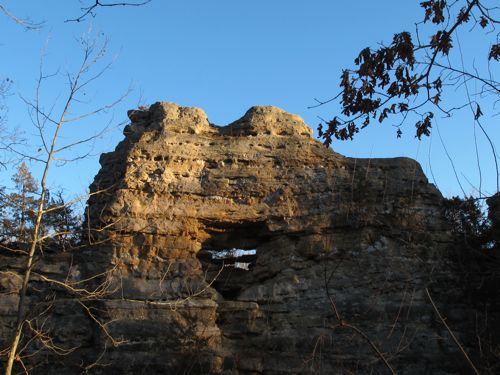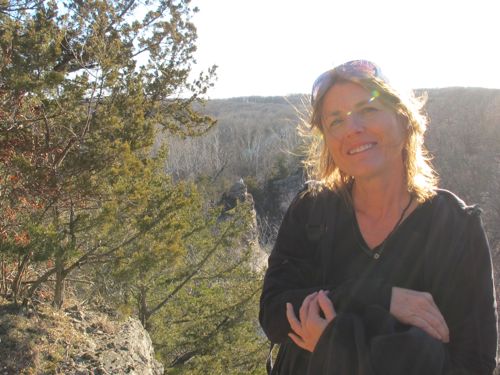The last golden rays of 2011 slipped away gloriously yesterday, lingering across the chalky face of the Pinnacles, an ancient towering limestone formation in the north of Boone County, Missouri – one of the places on this planet I will always call home.
The unseasonable warmth had us removing layers as we scrambled up to catch a glimpse of the world from on high. Another climatic oddity in a year that was full of them. Change is in the air, for those with eyes to see: We are closing the book on a year that saw vast swaths of the American Southwest go up in smoke, millions of dollars of hurricane damage in Vermont, a monster tornado that erased big chunks of Joplin, massive flooding in Australia, the Phillippines and Southeast Asia and record-breaking heat waves in Europe and much of the United States.
My mother’s garden in the Missouri countryside was cooked before it could be harvested. Where I live, in Mexico, widespread crop failure due to extended drought pushed more subsistence farmers to leave the land for the traffic-choked cities or for a desperate, life-threatening dash for El Norte, the forbidden promise of employment across the northern border. But today, on this balmy December day, global warming seems a welcome respite from the bone-chilling cold that usually accompanies us at this time of year. So I won’t complain.
Much has been written about this turning of the ages; no place on Earth is more excited about the Mayan prophecies than Mexico, birthplace of the Mayan calendar that ends this year. To me, it’s impossible not to link this prophecy with the profound changes we are facing. I’m not speaking of Armageddon – rather, a time of reckoning as we end a cycle of industrial excess. The Mayan people I have spoken with are laughing at the notion that the end of the calendar means the end of the world. It’s simply the end of a cycle, and the beginning of a new one, they reassure anyone who asks. But in more serious conversations, they shared with me their hope, as fervent as my own, that a long-awaited shift is pending, and in fact has already begun.
“After five centuries of oppression, we’re ready for a change,” Rony, a Mayan friend from Lake Atitlan, Guatemala, told me. “It’s the only hope we have.”
We in the global North have a much different perspective than a poor Guatemalan. But like Rony, I stand convinced that a shift in our paradigm – our way of structuring the world, and indeed, our way of thinking – is long overdue. It could well be that 2012 will be just another blip in the ongoing march of human events: Like the much-ballyhooed Y2K, which many feared would leave the world in the dark, we might wake up the morning after and laugh.
But an irrevocable shift has already begun, and the Earth is rumbling beneath our feet. Our climate is changing around us, and the petroleum and other carbon-based fuels we’ve based our civilization upon is rapidly disappearing. Those twin crises are feeding a third, more visible one: the financial crisis that has the global economy hanging by a thread.
What better moment to reflect on the possibilities that the transition ahead might offer us. Rather than wait until crisis is staring us in the face, let’s confront it together and plan a gradual reduction in our dependence on oil. Transition Town movements and other grassroots groups around the world are not waiting for their governments to do it; they are already immersed in the work of creating and implementing energy descent plans, reconstructing webs of relationships in their communities, strengthening local economies and building resilience into their local communities. They are envisioning a future less dependent on consumerism and more dependent on each other.
Like Rony, I don’t claim to know what the end of the Mayan calendar really means. But like him, I stand in the fervent hope that the noblest instincts of the human spirit will prevail in the transition that faces us this year and in the years to come.
I close with words of wisdom from my friend Holger Hieronimi, a Mexican-German permaculture teacher and designer:
“The change is happening today, here and now. It’s like the transformation of a voracious and predatory caterpillar, into a butterfly of many colors. It’s happening on every level, throughout the entire system, within us, and beyond us as well. It means the redesign of landscapes internal and external. It means leaving the comfortable place of security, and preparing oneself for times of insecurity, uncertainty, even convulsions, and a total reorganization of the system.
It is a change of a society of industrial growth toward a new culture that sustains life.
Instead of resisting the change, we can be creative participants and protagonists in this process, supporting our families and communities in this difficult process of transformation.”
(Read the entire essay in Spanish on his website, here.)
Happy 2012. Let’s embrace the new and let go of the old with love, hope and light. Bring on the butterflies.
- ‘Planting Is a Right’: Guadalajara’s Urban Ag Rebels Rally Against Proposed Regulations — Again - January 21, 2026
- The women who kept a Mexican pueblo above water — and stopped a megadam - January 15, 2026
- Reading the Earth: How Mexican scientists are using nature to find the disappeared - January 7, 2026
climate change Mayan calendar peak oil Permaculture Transition movement Transition Towns


Hello, I think your blog is very interesting.
I’ve also a website dedicated to promote education and culture.
I wish that you will visit my site and see how we can work together to create a global education network.
http://www.1erdirectorioescolar.com
🙂